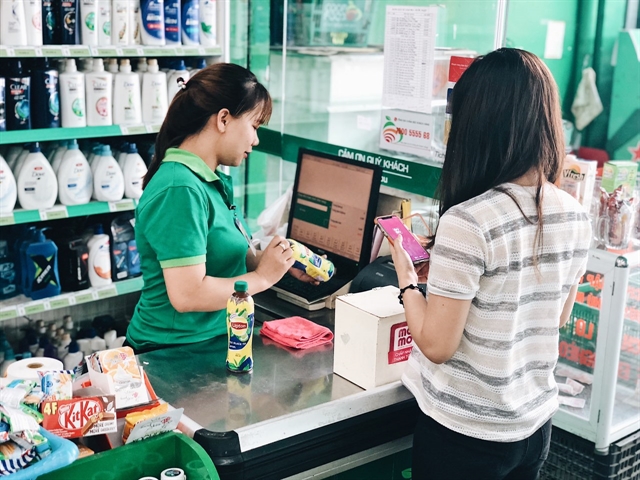To prevent the spread of coronavirus in Viet Nam, customers are encouraged to adopt cashless payment methods.

To prevent the spread of the new strain of coronavirus in Viet Nam, customers are encouraged to adopt cashless payment methods.
Some banks and fintech firms have taken the opportunity to promote the safety of cashless payments, especially after news that the People’s Bank of China is using ultraviolet light and high-temperature ovens to disinfect incoming cash. The bank also started replacing old notes with newly minted bills on February 4.
Nguyen Ba Diep, CEO of Momo, an e-wallet with more than 12 million users, told Viet Nam News: "Tests have shown cash harbours a wide variety of bacteria which can be transmitted by contact. The coronavirus is spread through normal contact, so cash is likely to be a risky source."
Diep quoted health experts as saying as 90 per cent of people in Viet Nam use cash, banknotes are sources of pathogens and pose a threat to public health.
While e–wallets like Moca and Airpay promoted the use of online payments, some banks are following suit and telling their customers to switch to online transactions while the epidemic continues.
On its Facebook page, SeABank told its customers to use electronic banking to check balances, transfer money and pay bills instead of going to the bank.
Ocean Bank told its customers to use the #EasyOceanBankMobile if they did not want to go to a branch.
Le Thi Thanh Hang, deputy director of the State Bank of Viet Nam (SBV)'s branch in HCM City, told local media on February 5 that the SBV has boosted the use of non-cash payments for a long time.
She added that passing from hand to hand, the banknotes were definitely not clean, adding: “It is advisable to gradually switch to digital payment methods and e-commerce instead of direct exchange with each other using cash during an outbreak.”
According to banking experts, Viet Nam, with a population of 97 million people, is a great market for fintech firms, including e-wallets, as more than 80 per cent of the retail market uses cash.
The Department of E-commerce and Digital Economy under the Ministry of Industry and Trade reported an annual growth of 35 per cent in the local fintech sector while the 'e.Economy SEA 2019' report by Google, Temasek Holding and Bain & Co said that digital payments in Southeast Asia are expected to cross $1 trillion by 2025, becoming the payment method for nearly one in two dollars spent in the region. — VNS





